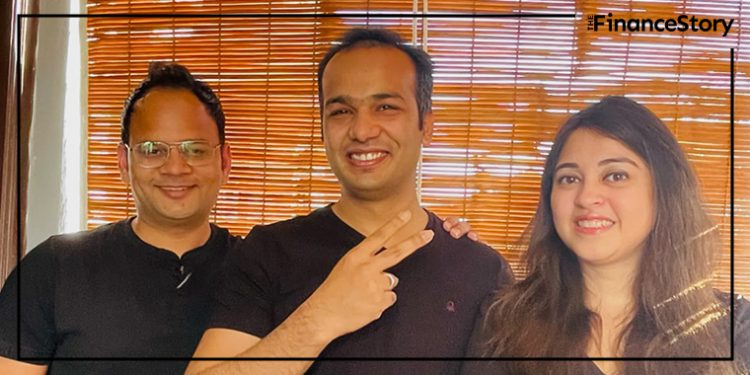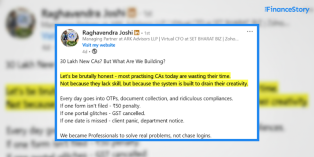- Udit Chaturvedi is a Chartered Accountant with over 14 years of experience in different industries.
- His decision to quit his well-settled no-risk job at Ernst & Young contributed to his burgeoning career in the startup world.
- With his fellow co-founders Rohit Jain and Manika Tiwari, his efforts paid off after establishing DUX– a live tutoring affordable engagement-heavy platform with subscriptions starting at just INR 750 per month.
- Today, 20,000+ students have enrolled on their subscription-driven platform with over 70 % of the students coming through word-of-mouth referrals.
- Here he shares how they raised funds after 100 rejections.
Backstory
I was born in Bateshwar, a village situated 70 km away from Agra, UP. At the age of 4, in May 1990, I moved to Rishra in the Hooghly district of West Bengal, a suburb located 20 km away from Kolkata.
Why did I choose to pursue CA? More than anything else, the reason to choose CA was its affordability and high payoff.
I started my career with E&Y Bangalore in the Audit team through campus placement. Operating with audit provided me the opportunity to work and explore different industries like IT, manufacturing, and E-commerce.
Like any other EY employee, the plan was always to become a partner at E&Y one day. However, life had its own plan.
While working on some startup audits, I decided to see the other side of the world. That is why I left my secure job at E&Y and plunged into the startup world.
Around the same time, the plan of establishing our startup was still on the table and we extensively discussed it at length.
Finally, when my daughter started schooling, I realized how expensive education had become in India.
After engaging in a conversation with Rohit (now my co-founder) – who has been teaching for the last 6 years, we both realized that education is a basic right and no one should lose out on it because they cannot afford to pay for it.
Manika has been passionate about this field since time immemorial. She had been a teacher at TIMES for Verbal Ability for 2 years.
Our ideas were based on these problems and thus began our journey with DUX Education in 2020.
DUX stands for “The Leader,” “The Guide,” and “The Class’s Top Pupil.” DUX has the same pronunciation as the Hindi word “Daksh,” which means “Skilful.” At DUX, every student and tutor personifies all of these adjectives.
We launched DUX with the goal of providing high-quality after-school tuition from India’s greatest teachers.
Currently, we cater to K-12 kids (Class 1-Class 12) for CBSE and ICSE Board. Students no longer have to settle for their neighborhood teacher. They can now choose the best from throughout India and learn through live coaching with just 10 students in each batch
Bootstrapping to fundraising
As founders, we have always believed in testing the product thoroughly before taking in any money from outside.
We started in early 2020. We spent 6 months designing the product before actually launching it in August 2020. This meant we had a decent understanding of the market and the problems that parents faced.
From Day 1, we had been revenue-generating and have had positive EBITDA. This cash flow, along with a small investment from the founders helped us initially.
Once we tested our hypothesis, we wanted to expand, which required more capital.
In January 2021, we did a small friend and family round to raise funds, which helped us build the PMF (product-market mix) and gain a better understanding of the market. Given our finance background, we have been able to grow while keeping the burn rate in check!
We grew 10x in 10 months following this period. We knew that we are now ready to take on larger growth targets.
The idea of this fundraising was to turbocharge our growth efforts which necessitate spending money on marketing and team building.
In February 2022, we finally raised our seed round from Malpani Ventures.
Journey To Fundraising – after 100 rejections
From the outside, fundraising appears to be quite smooth and quick (Especially after the “Shark Tank” show). This is, nevertheless, the most difficult and time-consuming activity. It takes a lot of the founder’s time and effort, but it is clearly worthwhile :).
Beginning in May 2021, we began reaching out to potential investors. At least 100 rejections were received.
We then reached out to Dr. Aniruddha Malpani, an ardent critic of Ed-Tech firms. To us, his viewpoints and our vision appeared to be in sync. However, we received a flat “NO” in our first correspondence. He misunderstood us as another Ed-Tech company that provided recorded classes.
We continued to email him the details of our progress, and one fine day, he agreed to meet with us, and we are now the recipients of one of his largest seed round cheques.
Approaching investors for fundraising
Fortunately, as a CA, understanding money and making the business was not a tough task for me.
For the majority of tech entrepreneurs, this presents a new barrier in the fundraising process.
We were extremely clear from the start about not wasting money on activities just because everyone else does, and this let us develop organically while keeping our CAC(Customer acquisition cost) in check.
Our CAC was $5, whereas rival ed-techs were paying anything from $250 to $500 to get subscribers. Yes, you heard that right: $5 versus $250. The rationale is simple: students study for a month on our platform for just $10, with no commitment, as opposed to $400-$500 on other platforms (for a year).
Any investor would look at a few key numbers initially, such as Market Size, Market Competition, Place for New Players, Current Average CAC in the Segment, Retention Rate/Churn, and so on.
We began focusing on all of the parameters from the beginning, which aided us in reaching out to investors and obtaining the first meeting more quickly.
Things to keep in mind when fundraising
As I previously stated, any investor’s primary emphasis is on the founders, followed by the business you are establishing. They are looking for the ideal mix of excellent founders and scalable business ideas.
An investable firm is one that has a large market, a well-established PMF, is scalable, and can grow multifold without requiring a large financial input.
If you are someone who has no idea about the fundraising area, you might have a few questions running around in your mind.
How should you begin? What are the things you should have answers for? Where should you seek guidance that is practical and in the right direction?
I would suggest taking a top-down approach to this.
When you startup, you should have concrete answers to the following questions –
- Why are you starting this particular line of business? Essentially why are you right for this business and why is this business right for you?
- What does the market look like? What is a realistic estimate of TAM (total addressable market), SAM (served addressable market), and SOM? (TAM- total addressable market, SAM-served addressable market, SOM – serviceable obtainable market)
- Can you replicate the initial success at scale in terms of customer experience?
- Who are the other players in the market and what is your right to win?
To be honest, while you will find a lot of articles on the net, my suggestion would be to use open resources to just acclimatize yourself to the technical terminologies.
For everything else, you will have to go back to the drawing board at least 10 times before you start arriving at correct answers.
Future plans
We want to take DUX to every nook and corner of the country – engaging, quality education should be a necessity and not a luxury.
We are looking to grow 10x from where we are today. Thankfully, our existing customers help us get more of their friends and family to the platform. That is a testament to the fact that what we are building is on the right track.
With this fundraiser, we have Dr. Malpani also join the DUX family. Together, we will create edtech as it should be!














